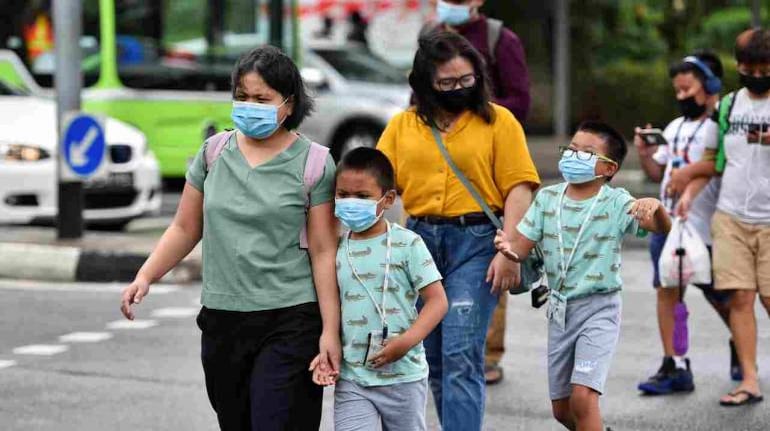



Singapore will make wearing masks outdoors optional as part of its lifting of most COVID-related restrictions for fully vaccinated citizens and international travellers.
In a live address at 11am local time on March 24, Singapore Prime Minister Lee Hsien Loong talked about the country’s fight against the coronavirus pandemic and announced relaxation of most containment measures.
“With each new wave, we had to move quickly and adapt… In the early stages, when little was known about the virus, we adopted stringent measures… We bought time to ramp up our healthcare capacity and roll out a comprehensive national vaccination programme,” he noted.
Also Read: New COVID-19 cases in India hover below 2,000 for 5th day in a row
Loong acknowledged people’s collective efforts, adding “You understood the mission and did your part… Businesses and essential workers also did their part, to keep our economy and social services going. Thanks to your grit and resourcefulness, we protected Singaporeans’ livelihoods, and prepared ourselves to emerge stronger from the pandemic.”
These were the changes announced, to be implemented from March 29 onwards:
— Doubling of the group size from the current 5 persons, to 10 persons.
— Up to 75 percent of employees who can work from home allowed to return to their workplaces.
— Capacity limit for larger events and settings (those with more than 1,000 people) increased to 75 percent.
— Wearing of masks outdoors is made optional as risk of transmission is significantly lower, but indoors, masks will still be mandatory.
— Safe distancing requirements maintained for now – one meter between groups where masks are off, to minimise transmission in mask-off settings.
— Substantial easing up of cross-border travel since nearly all cases are domestic.
— Will streamline testing and quarantine requirements for travellers via a simplified Vaccinated Travel Framework which will also let Singaporeans travel abroad more easily – almost like before COVID-19.
— Will also lift most restrictions for fully vaccinated visitors entering Singapore.
Loong noted, “After this major step, we will wait a while to let the situation stabilise. If all goes well, we will ease up further. But we should also be psychologically prepared for more twists and turns ahead… But whatever happens, we now have the knowledge and the means to keep everyone safe.”
“Resume more normal lives, enjoy larger gatherings of family and friends, go outdoors without masks, or reunite with loved ones abroad. But do not throw all caution to the wind. Each one of us must still play our part: Comply with the revised SMMs. If you feel ill, test yourself. If you test positive, isolate yourself at home. If you test negative, and decide to go out, please wear a mask to protect others, even outdoors, just in case. Let us all continue to exercise personal and social responsibility, to keep ourselves well, to keep others safe, to avoid adding to the burden on our healthcare workers… I thank everyone for your continued trust and support. Let us keep it up, and see through this pandemic as one united people. Thank you,” he added.
Living with COVID-19
Earlier on March 18, Singapore’s Health Minister Ong Ye Kung noted that hospitals are still “very busy and stressed”, but added that this is due to a large number of non-Covid-related emergency department admissions while the Omicron wave is subsiding.
As of then, the country had already eased social distancing restrictions for religious places with vaccination and mask requirements in place. Hindu temples are allowed to remove barricades used to segregate devotees into safe management measures (SMM) zones and mosques no longer have to space out their congregations during prayers.
The 1,000-person limit for worship service is also removed and a 50 percent capacity cap has been put in place instead. Consequently, Minister-in-charge of Muslim Affairs Masagos Zulkifli told reporters during a visit to the Kampung Siglap Mosque that the community can look forward to more mosque activities to return during the fasting month of Ramadan, which starts on April 2.
Churches also told worshippers that they no longer have to book seats for mass or be separated into zones, though vaccination status will still be verified.
For healthcare workers, mandatory twice-a-week rostered COVID-19 test has been eliminated from March 21 onwards, instead self-test will be allowed for those who are unwell or display mild to severe symptoms.
Notably, Singapore was among of the first countries to impose strict protocols for “living with COVID-19”, but plans to ease curbs had to be slowed down amid outbreaks. The new relaxations come as the country’s Omicron wave seems to be receding.
During peak of the Omicron infections in February, Singapore reported close to 26,000 cases daily. As of March 23, this number is down to 9,000 daily cases, with most patients displaying mild to no symptoms.
Around 92 percent of Singapore’s 5.5 million population is fully vaccinated and another 71 percent have received a booster jab.
(With inputs from Reuters and PTI)
Find more coverage on coronavirus, health and world news here
Discover the latest Business News, Sensex, and Nifty updates. Obtain Personal Finance insights, tax queries, and expert opinions on Moneycontrol or download the Moneycontrol App to stay updated!
Find the best of Al News in one place, specially curated for you every weekend.
Stay on top of the latest tech trends and biggest startup news.